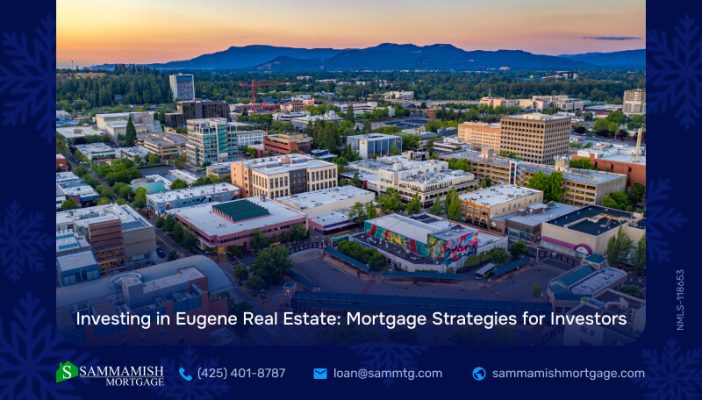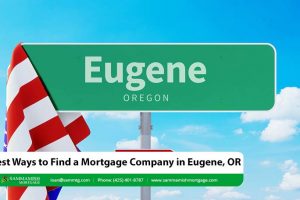No Obligation and transparency 24/7. Instantly compare live rates and costs from our network of lenders across the country. Real-time accurate rates and closing costs for a variety of loan programs custom to your specific situation.

Are you thinking about buying an investment home in Eugene, Oregon?
It’s a smart move. The city of Eugene offers a stable real estate market with steady demand from both home buyers and renters.
This two-part guide explains (1) why you might want to invest in Eugene real estate and (2) the different types of mortgage strategies that are worth exploring.
Eugene, Oregon, is a medium-sized city of roughly 180,000 people located in the Pacific Northwest. It’s situated about 50 miles east of the Oregon Coast and 110 miles south of Portland.
Eugene is known for its focus on arts and culture, outdoor recreation opportunities, and environmental consciousness. It’s also home to the University of Oregon and its famous track and field program, giving Eugene the nickname “TrackTown USA.”
The Eugene-Springfield metro area has a diverse economy anchored by major employers like PeaceHealth medical center and the University of Oregon. Eugene’s strong economy helps to support the local real estate market as well, by attracting and enabling home buyers.
Eugene has experienced steady population growth in recent years, partly because it makes frequent appearances on “best places to live” rankings. Population growth, coupled with limited housing supply in certain areas, can drive up rental rates and property values.
The University of Oregon’s presence in the city creates a consistent demand for rental housing, particularly near the campus. This can provide investors with a reliable tenant base with the potential for steady rental income.
While home prices in Eugene have risen over the past few years, it’s still cheaper than a lot of West Coast cities like Portland, Seattle, and San Francisco. This makes it an attractive entry point for investors seeking relative affordability and a broader pool of renters or buyers.
Eugene offers a variety of neighborhoods with different characteristics and price points. This gives investors a lot of options to support their specific strategies. Be sure to consider some of the best neighborhoods in Eugene before making an investment property purchase.
When you buy an investment property in Eugene, you have a lot of different loan options. They range from mainstream conventional mortgages to specialty products like a DSCR loan in Oregon.
In addition to the different loan types that are available, Eugene real estate investors have different strategies and business models to explore.
This strategy involves using the built-up equity from an existing property as collateral to secure loans for new Eugene real estate investments. It’s usually done through home equity loans, HELOCs, or cash-out refinancing. With this option, investors can access capital without selling their existing assets.
“House hacking” in Eugene occurs when an investor purchases a multi-unit property, lives in one of the units, and rents out the others. This financing strategy allows investors to qualify for more favorable loan terms, like a lower down payment and interest rate. It also offsets the mortgage costs with rental income, essentially making the property pay for itself.
Some buyers choose to partner with like-minded investors to pool their financial resources. This allows the partners to purchase larger or more complex properties that might be difficult to acquire individually.
A lot of investors use the BRRRR strategy in Eugene. With this approach, investors buy distressed properties, renovate them to add value, rent them out to generate income, and then refinance to pull out the increased equity. The extracted capital can then be used to repeat the process with another property.
This umbrella term includes several non-traditional financing methods, such as seller financing, lease-to-own agreements, and other innovative arrangements. These strategies can be particularly useful for investors with limited cash or credit, because they offer an alternative path for purchasing properties.
With this strategy, Eugene real estate investors focus on acquiring properties that generate positive cash flow from rental income. This means that the rental income exceeds all expenses, including mortgage payments, property taxes, insurance, and maintenance. The goal here is to generate consistent monthly income, with each new acquisition adding to that income.
Here are key considerations to make when investing in Eugene, OR to ensure a well-rounded understanding of the market and opportunities:
Research the median home price in Eugene and how it compares to nearby cities like Portland or Salem. This helps gauge affordability and potential ROI.
Analyze how Eugene’s housing market has performed over the past 5–10 years. Look at home appreciation rates, rental demand, and any signs of market cooling or heating up.
Focus on areas with easy access to major employment hubs. Further, decide whether short-term rentals (Airbnb) or long-term leases are more profitable based on Eugene’s zoning laws and seasonal tourism.
Oregon is known for tenant-friendly policies, including strict eviction procedures and rent control. Be sure to understand local regulations to avoid unexpected legal challenges.
Check for zoning restrictions that may affect multi-unit properties, vacation rentals, or renovations. Ensure you meet all local requirements for property management, rental registration, or renovations.
Decide whether you’ll manage the property yourself or hire a local property management company. The latter can be invaluable for out-of-town investors. Property management fees typically range from 8–12% of rental income. Weigh this expense against the convenience provided.
Oregon property taxes can vary by location. Research rates in Eugene to factor them into your budget. Understand how rental income will be taxed at the state and federal levels.
As you can see, there are many different products and strategies to consider when buying in the Eugene rental market. The key is to choose the right approach based on your financial situation and investing goals.
What are the best mortgage options for real estate investors in Eugene?
Typically, conventional loans, portfolio loans, and DSCR loans, and short- and long-term rental loans are available.
What is the difference between a conventional mortgage and an investment property loan?
Conventional mortgages are often used for primary residences, while investment property loans usually have higher interest rates, larger down payments, and stricter qualification criteria.
What are the qualifying criteria for investment property mortgages in Eugene?
Lenders consider credit score, income stability, debt-to-income ratio, down payment, and the property’s potential income.
Can I use rental income to qualify for a mortgage on an investment property in Eugene?
Yes, some lenders allow you to use projected or actual rental income to qualify, especially if you have a history of managing rental properties.
Are there specific lenders in Eugene that specialize in mortgage loans for investors?
Yes, lenders like Sammamish Mortgage are familiar with Eugene’s market and can help with investment property financing.
Why is Eugene, Oregon, a good place to invest in real estate?
Eugene offers a stable economy, growing population, and consistent rental demand—especially near the University of Oregon.
How does Eugene’s affordability compare to other West Coast cities?
Eugene is more affordable than cities like Portland or Seattle, making it attractive for entry-level investors.
What neighborhoods in Eugene are best for rental investments?
Areas near the university, downtown Eugene, and South Hills offer strong rental potential and appreciation.
How do I choose the right mortgage strategy for my investment goals?
Consider your cash flow needs, risk tolerance, and whether you plan to hold or flip the property.
If you’re looking to buy an investment property in Eugene, OR, we can help. Sammamish Mortgage has been in the lending industry since 1992, helping borrowers all over the Pacific Northwest including WA, OR, ID, CO, and CA. Contact us to find out more about our mortgage programs, or visit our website to get an instant rate quote.


Whether you’re buying a home or ready to refinance, our professionals can help.
{hours_open} - {hours_closed} Pacific
No Obligation and transparency 24/7. Instantly compare live rates and costs from our network of lenders across the country. Real-time accurate rates and closing costs for a variety of loan programs custom to your specific situation.
Adjust the parameters based on what you want to track